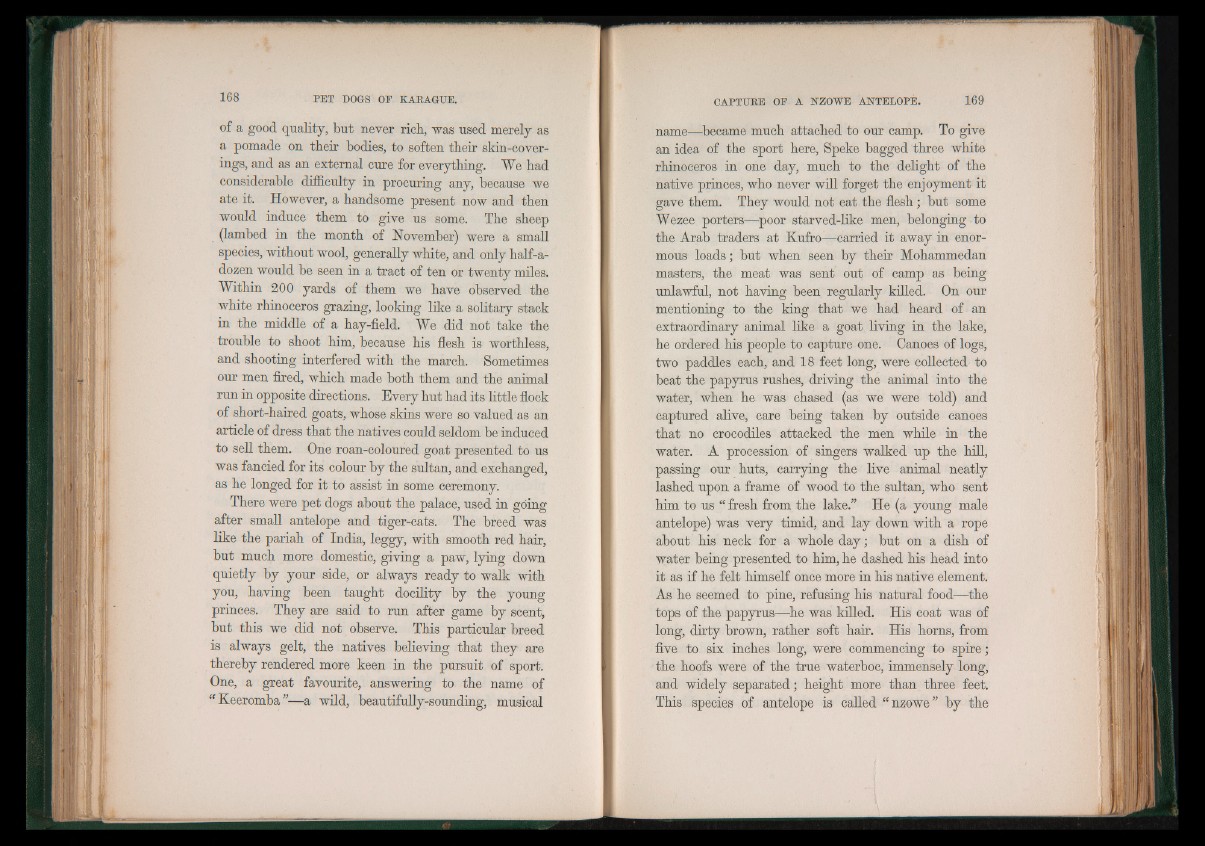
of a good quality, but never rich, was used merely as
a pomade on their bodies, to soften their skin-cover-
ings, and as an external cure for everything. We had
considerable difficulty in procuring any, because we
ate it. However, a handsome present now and then
would induce them to give us some. The sheep
(lambed in the month of November) were a small
species, without wool, generally white, and only half-a-
dozen would be seen in a tract of ten or twenty miles.
Within 200 yards of them we have observed the
white rhinoceros grazing, looking like a solitary stack
in the middle of a hay-field. We did not take the
trouble to shoot him, because his flesh is worthless,
and shooting interfered with the march. Sometimes
our men fired, which made both them and the animal
run in opposite directions. Every hut had its little flock
of short-haired goats, whose skins were so valued as an
article of dress that the natives could seldom be induced
to sell them. One roan-coloured goat presented to us
was fancied for its colour by the sultan, and exchanged,
as he longed for it to assist in some ceremony.
There were pet dogs about the palace, used in going
after small antelope and tiger-cats. The breed was
like the pariah of India, leggy, with smooth red hair,
but much more domestic, giving a paw, lying down
quietly by your side, or always ready to walk with
you, having been taught docility by the young
princes. They are said to run after game by scent,
but this we did not observe. This particular breed
is always gelt, the natives believing that they are
thereby rendered more keen in the pursuit of sport.
One, a great favourite, answering to the name of
“ Keeromba”—a wild, beautifully-sounding, musical
name—became much attached to our camp. To give
an idea of the sport here, Speke bagged three white
rhinoceros in one day, much to the delight of the
native princes, who never will forget the enjoyment it
gave them. They would not eat the flesh; but some
Wezee porters—poor starved-like men, belonging to
the Arab traders at Kufro—carried it away in enormous
loads; but when seen by their Mohammedan
masters, the meat was sent out of camp as being
unlawful, not having been regularly killed. On our
mentioning to the king that we had heard of an
extraordinary animal like a goat living in the lake,
he ordered his people to capture one. Canoes of logs,
two paddles each, and 18 feet long, were collected to
beat the papyrus rushes, driving the animal into the
water, when he was chased (as we were told) and
captured alive, care being taken by outside canoes
that no crocodiles attacked the men while in the
water. A procession of singers walked up the hill,
passing our huts, carrying the live animal neatly
lashed upon a frame of wood to the sultan, who sent
him to us “ fresh from the lake.” He (a young male
antelope) was very timid, and lay down with a rope
about his neck for a whole day; but on a dish of
water being presented to him, he dashed his head into
it as if he felt himself once more in his native element.
As he seemed to pine, refusing his natural food—the
tops of the papyrus—he was killed. His coat was of
long, dirty brown, rather soft hair. His horns, from
five to six inches long, were commencing to spire;
the hoofs were of the true waterboc, immensely long,
and widely separated; height more than three feet.
This species of antelope is called “ nzowe ” by the